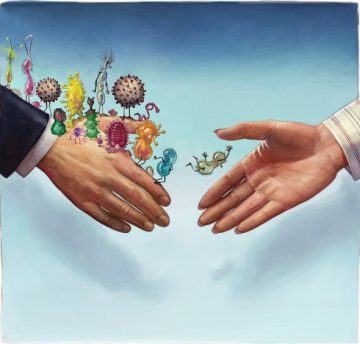Steve Mirsky in Scientific American:
 Here’s something I thought I’d never say: Donald Trump was correct. Back in 1997, anyway. About shaking hands. “The Japanese have it right,” the allegedly germaphobic Trump wrote (with co-author Kate Bohner) in the book Trump: The Art of the Comeback. “They stand slightly apart and do a quick, formal and very beautiful bow in order to acknowledge each other’s presence … I wish we would develop a similar greeting custom in America. In fact, I’ve often thought of taking out a series of newspaper ads encouraging the abolishment of the handshake.” Of course, because of COVID-19, the handshake is out. Unfortunately, it could make its own comeback without vigorous lobbying against it. I will now do some of that lobbying. “Recent medical reports,” Trump also wrote, “have come out saying that colds and various other ailments are spread through the act of shaking hands. I have no doubt about this.” Indeed, a search using the terms “handshake” and “infection” in journal articles between 1990 and 1997 turns up a 1991 write-up in the Journal of Clinical Microbiology with the title “Potential Role of Hands in the Spread of Respiratory Viral Infections: Studies with Human Parainfluenza Virus 3 and Rhinovirus 14.”
Here’s something I thought I’d never say: Donald Trump was correct. Back in 1997, anyway. About shaking hands. “The Japanese have it right,” the allegedly germaphobic Trump wrote (with co-author Kate Bohner) in the book Trump: The Art of the Comeback. “They stand slightly apart and do a quick, formal and very beautiful bow in order to acknowledge each other’s presence … I wish we would develop a similar greeting custom in America. In fact, I’ve often thought of taking out a series of newspaper ads encouraging the abolishment of the handshake.” Of course, because of COVID-19, the handshake is out. Unfortunately, it could make its own comeback without vigorous lobbying against it. I will now do some of that lobbying. “Recent medical reports,” Trump also wrote, “have come out saying that colds and various other ailments are spread through the act of shaking hands. I have no doubt about this.” Indeed, a search using the terms “handshake” and “infection” in journal articles between 1990 and 1997 turns up a 1991 write-up in the Journal of Clinical Microbiology with the title “Potential Role of Hands in the Spread of Respiratory Viral Infections: Studies with Human Parainfluenza Virus 3 and Rhinovirus 14.”
This piece is undoubtedly the one that Trump read in his comprehensive and careful research—it stood out as his likely source because most of the search results for that time period were for articles talking about the molecular “handshake” between an HIV protein and human cells. Such studies might only have brought him unpleasant reminders that led him on the Howard Stern Show to compare his risk of STDs to fighting in Vietnam.
In another piece I turned up, published in the journal Medical Record, Nathan Breiter wrote about running into a friend and automatically shaking hands, only to find the hand “rough and oily.” Breiter later learned that what he felt was syphilide: a skin lesion caused by syphilis. This experience got Breiter, as a trained physician, to thinking. After considering how handshakes happened—“the custom of shaking hands originated in the ancient and universal practice of grasping the weapon hand during a truce as a precaution against treachery”—Breiter suggests banishing the practice to the medical waste bin of history: “So we see that from a comparatively dark and illiterate period a custom having a rational origin, which rationale dwindled into nothingness during its spread and migration through successive centuries, was ushered into our glorious civilization, unnecessary in its essence, devoid of all intelligence, and positively injurious to public health.”
More here.
